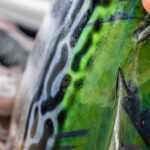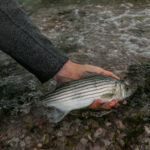
Getting Dirty in Louisiana: Carp Tournament Draws a Crowd
This past weekend, ASGA proudly sponsored the Dirty Carp Tournament in Louisiana — and no, you didn’t misread that.
By Tony Friedrich, Vice President and Policy Director
2020 has been one hell of a year. Every individual has faced unprecedented challenges. We hope that this holiday season provides a little normalcy for you and your family. We hope that it reminds us to be grateful for what we have and to never forget that there is always hope for a better future. Hope is what defines human tenacity and resiliency.
So, with some hope (we are fishermen, after all) and a smattering of grateful appreciation, we at ASGA are optimistic for what 2021 will bring us. We have some serious fights ahead. Some are old and some are new, but all will require our attention. We will be there fighting for the resource and the future of fisheries in our country.
It never hurts to make a Christmas wish list—just ask all kids around the world who are feverishly writing the big guy at the North Pole with last minute additions. Here is ours.
**
Dear Santa,
We passionately believe that we have been a good Association throughout 2020. We worked hard for our members during the pandemic shutdowns. We made sure that their businesses stayed afloat, and that they were not forgotten on Capitol Hill.
We fought hard for the fish. We successfully pushed for a new menhaden management approach that considers the species’ ecosystem role. We took a leadership position on striped bass management. We created new partnerships. We worked on legislative solutions for the major problems we face.
We did it all on a shoestring budget while working around all the challenges the pandemic presented. We worked weekends and late into the night not because we get overtime but because we love the ocean.
We hope all these deeds places us firmly on the “Nice” list.
We would love for the Atlantic States Marine Fisheries Commission to follow its own rules. Striped bass were declared overfished nearly two years ago and there is still no rebuilding plan, despite the Commission’s own requirement to rebuild the stock by 2029. The narrative is that there is no rebuilding plan because Amendment 7 has been initiated. That process, begun last August, will take until 2022. All that time, the 2015-year class, the largest in recent memory, will be getting hammered due to the new slot limit.
Santa, that is why we advocated for a 1 fish @35” limit. We wanted to give the 2015’s a chance to spawn a few times. The 2015’s are the last real hope for a fast recovery. Even though over 90% of the comments wanted the 1 @35” limit, we were ignored yet again. How about ASMFC follows the rules and cares about what the public says? Yes, I think that would be nice.
It would be great if Congress could work together towards a better future for federal fisheries management. We have wasted so much time and energy on trying to stop bad legislation. On the bright side, we have gotten good at killing bad bills. On the other hand, it would be great to work on something that would provide a better future for all through long term stability.
Congressmen Huffman (D-CA-2) and Case (D-HI-1) gave us a road map for an improved Magnuson-Stevens Act last Friday. Now is the time for us to come together and realize that fisheries stability is for more important than flexibility. We also need to understand that we need to manage our resources in a way that will provide for future generations. Our wish is that fishermen and policymakers alike understand that if you take care of the fish, the fish will take care of you.
The last thing on our list is something that is tough. No, it isn’t a PS5. (Feel free to throw one of those under the tree) It is a wish that development does not outpace science in ocean aquaculture and offshore wind.
Most fishermen are aware of the planned construction of wind farms off the Atlantic coast. They are coming. The Department of the Interior has issued offshore wind leases for sixteen projects in coastal waters from Massachusetts to North Carolina with another seven in review. These lease areas thus far cover over 1.7 million acres—greater than the size of Delaware. Wind energy has plenty of upsides. However, there are a lot of questions about the environmental, fishery, and economic impacts that are yet to be answered. Recreational anglers need a seat at the table. Our interests are not being fully represented. We need a bigger voice.
While offshore wind is well publicized, ocean aquaculture has almost slipped under the radar, at least here on the Atlantic coast. On May 7, 2020, the Executive Order on Promoting American Seafood Competitiveness and Economic Growth was signed (here was our first take when it was released). Section 2, Part A of the EO states as the federal government’s policy: “Identify and remove unnecessary regulatory barriers restricting American fishermen and aquaculture producers;”. I don’t know about you Santa, but this doesn’t give us the warm and fuzzies.
Open ocean finfish aquaculture is not a good idea. We are not against shellfish or plant aquaculture or land-based, closed-system fish farms. You only need look at the history of net pen aquaculture to understand how damaging it has already been in U.S. waters. The Wild Steelhead Coalition has done great work on this issue in Puget Sound. Bonefish & Tarpon Trust recently came out in strong opposition to an almaco jack farm in the Gulf of Mexico. Just a few days ago, Canada decided to phase out net pen aquaculture in the Discovery Islands, British Columbia . This move recognizes the risks associated net failures, disease spreading, waste issues, and non-native species interacting with native Pacific salmon.
Restaurants all over the country are failing. Commercial fishermen didn’t have a market for their catch due to pandemic restrictions. Yet we are going to forge ahead with this plan to ramp up aquaculture?
What do you think net pen fish eat? If you said menhaden, you are correct.
We aren’t asking for a new 40’ center console or a heavy-duty truck to tow it. (Much like the aforementioned PS5, it is OK to put this under the tree) We are just asking for people to follow their own rules, for better fisheries laws, for better science, and a little common sense. Is that too much to ask for?

This past weekend, ASGA proudly sponsored the Dirty Carp Tournament in Louisiana — and no, you didn’t misread that.

After years of data pouring in from The Albie Project, advocacy, persistence, and support from

This morning, the Connecticut Environment Committee held a hearing on House Bill 6248, a bill

Photo Credit: A striper released in Connecticut waters, courtesy of Mike Querfeld. Connecticut House Bill 6248 (2025
We rely on our members and donations to keep fighting for a sustainable tomorrow in marine conservation.
GIVE THE GIFT OF FISHERIES CONSERVATION THIS HOLIDAY SEASON. SHOP ASGA GOODS THAT FUND FISHERIES RESEARCH & ADVOCACY CAMPAIGNS
JOIN ASGA IN CALLING FOR CRITICAL MANAGEMENT ACTION AFTER YEARS OF SPAWN FAILURES & POOR MANAGEMENT.
By using this website, you agree to our use of cookies. We use cookies to provide you with a great experience and to help our website run effectively. To learn more, please review our privacy policy.